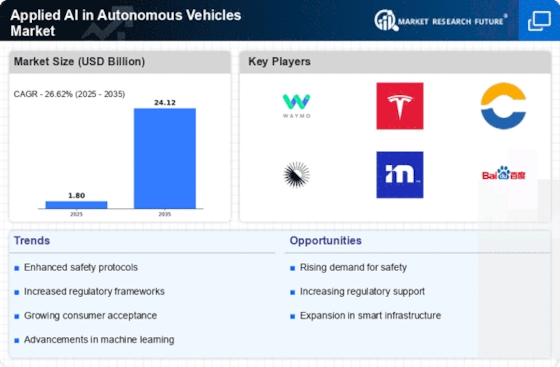Top Industry Leaders in the Applied AI in Autonomous Vehicles Market

Competitive Landscape of Applied AI in Autonomous Vehicles Market:
The autonomous vehicle (AV) market is undergoing a technological revolution driven by the integration of applied artificial intelligence (AI). This complex and evolving landscape features a diverse range of players vying for dominance, each employing unique strategies to secure market share. Understanding this competitive landscape is crucial for any company seeking to invest in or capitalize on the immense potential of AI-powered AVs.
Key Players:
- Alphabet
- Tesla
- Baidu
- Ford
- Mircosoft
- Volvo
- Toyoto
- Aptiv
- Intel
- Continental
- Bosch
- Nvidia
Strategies for Market Share:
- Technological Innovation: Companies are fiercely competing to develop the most advanced AI algorithms for perception, decision-making, and control. Areas of focus include sensor fusion, machine learning, deep learning, and computer vision.
- Strategic Partnerships: Collaboration is key, with alliances forged between automakers, tech giants, and startups to combine expertise and resources. Examples include GM's partnership with Cruise and Ford's collaboration with Argo AI.
- Vertical Integration: Some companies are opting for vertical integration, acquiring sensor manufacturers, mapping companies, and even ride-hailing services to create a complete AV ecosystem. Tesla's self-developed AI stack and Waymo's lidar technology development are prime examples.
- Data Acquisition and Management: Access to and effective utilization of real-world driving data is critical for training and refining AI algorithms. Companies are investing heavily in data collection infrastructure and platforms to gain an edge.
- Regulatory Advocacy: Influencing regulations and promoting public acceptance of AVs are crucial aspects of long-term success. Leading players are actively engaging with policymakers and conducting pilot programs to demonstrate the safety and benefits of their technology.
Factors for Market Share Analysis:
- Technological Leadership: The efficacy and reliability of AI algorithms are prime determinants of market share. Benchmarking performance on metrics like object detection accuracy, reaction time, and route planning is crucial.
- Commercialization Strategy: Companies with clear paths to monetization, be it through robotaxi services, licensing technology, or partnerships with existing carmakers, hold an advantage.
- Geographical Reach: Global deployment capabilities and adaptation of AI systems to diverse driving environments are key factors for success in a potentially trillion-dollar market.
- Brand Reputation and Trust: Public perception of safety and reliability heavily influences consumer adoption. Building trust through rigorous testing, transparency, and ethical AI development is essential.
Emerging Companies and Technologies:
- Startups: New players like Aurora and Pony.ai are emerging with innovative approaches to perception and decision-making, challenging established players.
- Sensor Technologies: Advancements in lidar, radar, and camera technology are constantly improving the accuracy and range of data available to AI systems.
- Edge Computing: Onboard processing power is crucial for real-time decision-making in AVs. Companies are developing specialized hardware and software for efficient edge computing solutions.
Current Company Investment Trends:
- Increased R&D Spending: Leading players are pouring billions into AI research and development, with a focus on deep learning algorithms and sensor fusion capabilities.
- Acquisitions and Partnerships: Mergers and acquisitions are accelerating as companies seek to consolidate expertise and expand their offerings. Strategic partnerships are also on the rise, bridging gaps in capabilities and resources.
- Focus on Commercialization: With the technology maturing, there is a shift towards concrete commercialization plans. Ride-hailing services, delivery vehicles, and niche applications are entering pilot stages, paving the way for broader market adoption.
Latest Company Updates:
January 12, 2024, Waymo, the autonomous vehicle unit of Alphabet, has expanded its ride-hailing service to include several suburbs of Phoenix, Arizona. This expansion marks Waymo's first foray into suburban operations and could be a key step towards wider adoption of autonomous vehicles.
January 11, 2024, Mobileye, an Israeli supplier of driver-assistance technology, and Volkswagen have announced a partnership to develop and deploy Level 4 autonomous vehicles in Europe. These vehicles will operate without human drivers in specific areas and conditions.
January 10, 2024, Cruise, the autonomous vehicle subsidiary of General Motors, has received a permit from the California Public Utilities Commission to operate its self-driving cars without human safety drivers in San Francisco at night. This marks a significant step forward for Cruise's commercialization plans.










